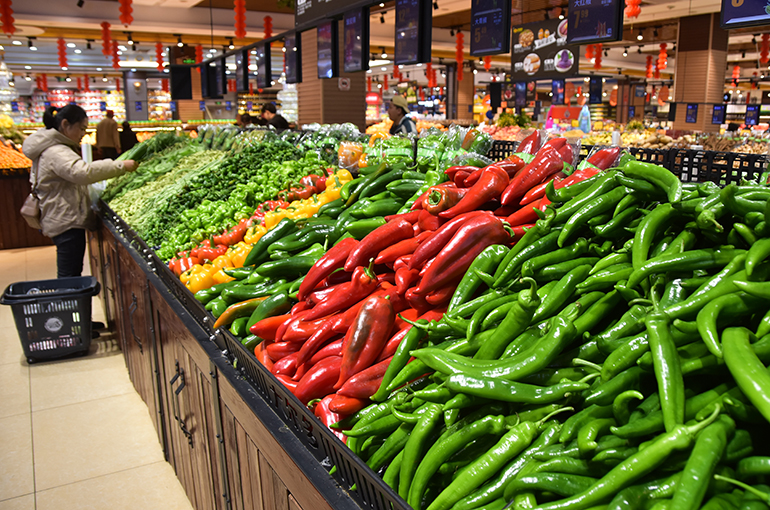 China’s Consumer Prices Fall for Third Straight Month in April as Factory Gate Prices Drop Most in Six Months
China’s Consumer Prices Fall for Third Straight Month in April as Factory Gate Prices Drop Most in Six Months(Yicai) May 12 -- China’s consumer prices fell in April for the third consecutive month, while factory gate prices declined the most since last October.
The consumer price index fell 0.1 percent last month from a year ago, after declines of 0.1 percent and 0.7 percent in the prior two months, according to figures released by the National Bureau of Statistics on May 10. Chief economists surveyed earlier by Yicai had forecast a CPI drop of 0.2 percent. On a monthly basis, the CPI inched up 0.1 percent.
The year-on-year decline was mainly the result of lower international oil prices, the NBS data also showed.Energy prices dropped 4.8 percent in April from the same period last year, with oil prices plunging over 10 percent, greatly contributing to the decline in the CPI. The core CPI, which includes energy and food prices, rose 0.5 percent.
Policies to boost consumption and update equipment continue to take effect, spurring demand for certain consumer goods and capital equipment and driving prices higher in related industries. The development of new quality productive forces, coupled with the deep integration of technological and industrial innovation, is also contributing to price gains in some sectors.
High prices raise living costs, but prices that are too low hurt corporate earnings, ultimately impacting incomes and employment, Sheng Laiyun, a deputy director of the NBS, said at a recent press conference.
This year’s Two Sessions -- the country’s key policy-setting meetings held in March -- set a clear goal of maintaining overall price levels within a reasonable range, so the authorities have rolled out measures to support price recovery, Sheng noted.
As the economy rebounds and demand picks up, and as the effects of price-supporting policies continue to take effect, prices are expected to stabilize and gradually rise, he added.
Factory Gate Prices
Producer prices slid for the 31st consecutive month in April, with the producer price index falling 2.7 percent from a year earlier, compared with a 2.5 percent decline in March, according to the NBS data. The chief economists polled by Yicai had expected a drop of 2.7 percent. On a monthly basis, the PPI dipped 0.4 percent.
The gauge fell partly as a result of external factors, such as broad declines in global commodity prices, as well as seasonally weaker domestic demand for coal coupled with strong substitution by renewable energy, leading to some lower energy prices, said Dong Lijuan, a chief statistician at the NBS.
Industrial product prices will hinge on policy effectiveness, with real estate support playing a critical role, said Wang Qing, chief macroeconomic analyst at Golden Credit Rating. He highlighted the importance of monitoring tariff negotiations between the United States and other countries and the progress in the China-US trade talks because they will greatly impact global commodity prices.
China’s economy remains fundamentally stable and resilient, with coordinated economic policies driving high-quality development, Dong noted. Improved supply-demand dynamics in some sectors narrowed price declines, signaling positive shifts in the pricing landscape, he added.
Editor: Futura Costaglione